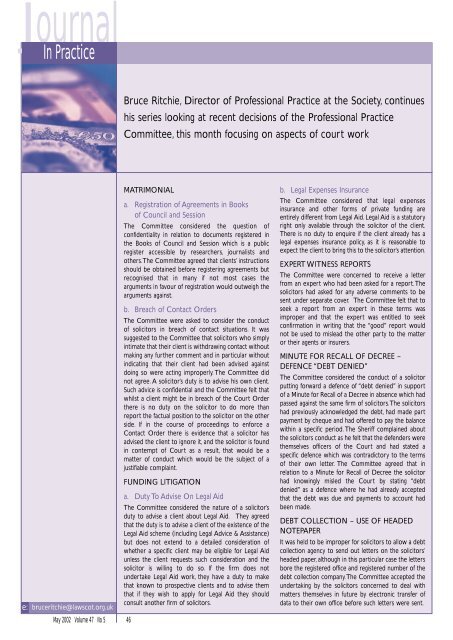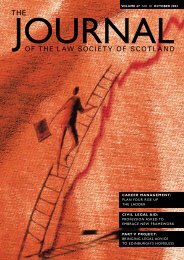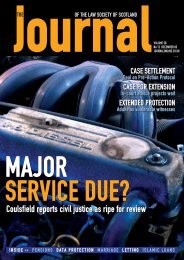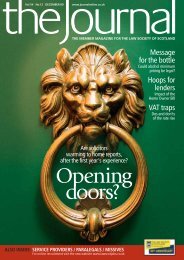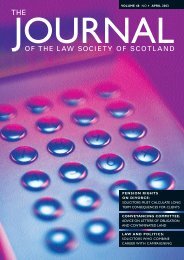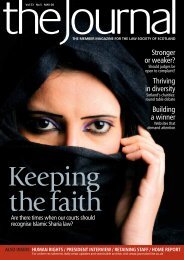OF THE LAW SOCIETY OF SCOTLAND - The Journal Online
OF THE LAW SOCIETY OF SCOTLAND - The Journal Online
OF THE LAW SOCIETY OF SCOTLAND - The Journal Online
You also want an ePaper? Increase the reach of your titles
YUMPU automatically turns print PDFs into web optimized ePapers that Google loves.
<strong>Journal</strong><br />
e:<br />
In Practice<br />
bruceritchie@lawscot.org.uk<br />
May 2002 Volume 47 No 5 46<br />
Bruce Ritchie, Director of Professional Practice at the Society, continues<br />
his series looking at recent decisions of the Professional Practice<br />
Committee, this month focusing on aspects of court work<br />
MATRIMONIAL<br />
a. Registration of Agreements in Books<br />
of Council and Session<br />
<strong>The</strong> Committee considered the question of<br />
confidentiality in relation to documents registered in<br />
the Books of Council and Session which is a public<br />
register accessible by researchers, journalists and<br />
others.<strong>The</strong> Committee agreed that clients’ instructions<br />
should be obtained before registering agreements but<br />
recognised that in many if not most cases the<br />
arguments in favour of registration would outweigh the<br />
arguments against.<br />
b. Breach of Contact Orders<br />
<strong>The</strong> Committee were asked to consider the conduct<br />
of solicitors in breach of contact situations. It was<br />
suggested to the Committee that solicitors who simply<br />
intimate that their client is withdrawing contact without<br />
making any further comment and in particular without<br />
indicating that their client had been advised against<br />
doing so were acting improperly. <strong>The</strong> Committee did<br />
not agree. A solicitor’s duty is to advise his own client.<br />
Such advice is confidential and the Committee felt that<br />
whilst a client might be in breach of the Court Order<br />
there is no duty on the solicitor to do more than<br />
report the factual position to the solicitor on the other<br />
side. If in the course of proceedings to enforce a<br />
Contact Order there is evidence that a solicitor has<br />
advised the client to ignore it, and the solicitor is found<br />
in contempt of Court as a result, that would be a<br />
matter of conduct which would be the subject of a<br />
justifiable complaint.<br />
FUNDING LITIGATION<br />
a. Duty To Advise On Legal Aid<br />
<strong>The</strong> Committee considered the nature of a solicitor’s<br />
duty to advise a client about Legal Aid. <strong>The</strong>y agreed<br />
that the duty is to advise a client of the existence of the<br />
Legal Aid scheme (including Legal Advice & Assistance)<br />
but does not extend to a detailed consideration of<br />
whether a specific client may be eligible for Legal Aid<br />
unless the client requests such consideration and the<br />
solicitor is willing to do so. If the firm does not<br />
undertake Legal Aid work, they have a duty to make<br />
that known to prospective clients and to advise them<br />
that if they wish to apply for Legal Aid they should<br />
consult another firm of solicitors.<br />
b. Legal Expenses Insurance<br />
<strong>The</strong> Committee considered that legal expenses<br />
insurance and other forms of private funding are<br />
entirely different from Legal Aid. Legal Aid is a statutory<br />
right only available through the solicitor of the client.<br />
<strong>The</strong>re is no duty to enquire if the client already has a<br />
legal expenses insurance policy, as it is reasonable to<br />
expect the client to bring this to the solicitor’s attention.<br />
EXPERT WITNESS REPORTS<br />
<strong>The</strong> Committee were concerned to receive a letter<br />
from an expert who had been asked for a report.<strong>The</strong><br />
solicitors had asked for any adverse comments to be<br />
sent under separate cover. <strong>The</strong> Committee felt that to<br />
seek a report from an expert in these terms was<br />
improper and that the expert was entitled to seek<br />
confirmation in writing that the “good” report would<br />
not be used to mislead the other party to the matter<br />
or their agents or insurers.<br />
MINUTE FOR RECALL <strong>OF</strong> DECREE –<br />
DEFENCE “DEBT DENIED”<br />
<strong>The</strong> Committee considered the conduct of a solicitor<br />
putting forward a defence of “debt denied” in support<br />
of a Minute for Recall of a Decree in absence which had<br />
passed against the same firm of solicitors.<strong>The</strong> solicitors<br />
had previously acknowledged the debt, had made part<br />
payment by cheque and had offered to pay the balance<br />
within a specific period. <strong>The</strong> Sheriff complained about<br />
the solicitors conduct as he felt that the defenders were<br />
themselves officers of the Court and had stated a<br />
specific defence which was contradictory to the terms<br />
of their own letter. <strong>The</strong> Committee agreed that in<br />
relation to a Minute for Recall of Decree the solicitor<br />
had knowingly misled the Court by stating “debt<br />
denied” as a defence where he had already accepted<br />
that the debt was due and payments to account had<br />
been made.<br />
DEBT COLLECTION – USE <strong>OF</strong> HEADED<br />
NOTEPAPER<br />
It was held to be improper for solicitors to allow a debt<br />
collection agency to send out letters on the solicitors’<br />
headed paper, although in this particular case the letters<br />
bore the registered office and registered number of the<br />
debt collection company.<strong>The</strong> Committee accepted the<br />
undertaking by the solicitors concerned to deal with<br />
matters themselves in future by electronic transfer of<br />
data to their own office before such letters were sent.


